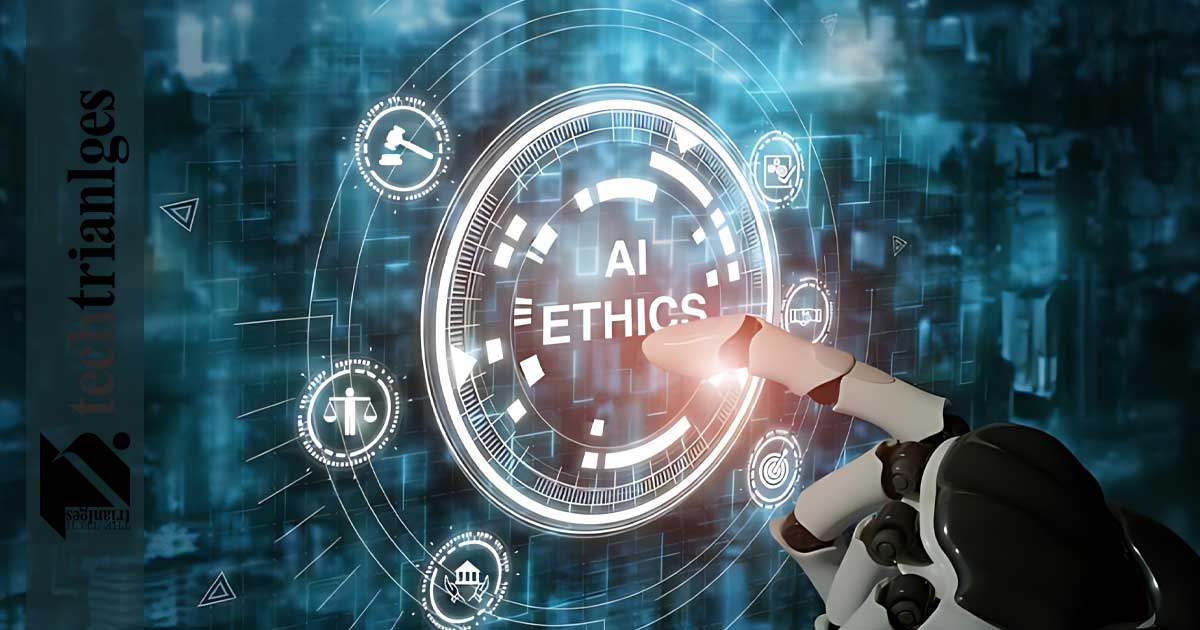Artificial intelligence ( AI) is a rapidly growing field with the goal of revolutionizing many aspects of our lives by making them easier and more automated. However, as AI systems become more powerful, there is a growing need to ensure that they are developed and used in an ethical and responsible manner.
But what is ethical AI and why is it important?
What is ethical AI?
The term ethical AI refers to the development and use of AI systems that align with socially established ethical principles and values. It implies designing AI systems that are transparent, accountable, and respectful of the rights and dignity of individuals. Ethical AI also involves ensuring that AI systems are not biased or discriminatory and do not unfairly harm or harm certain individuals or groups.
The consideration of whether AI is ethical or not depends on several factors. AI is generally
considered ethical if it is used responsibly and systems are designed that respect human rights, and the privacy and security of individuals.
Some of the ethical principles that have been proposed to guide the development and use of AI include transparency in algorithms and decisions, fairness and non-discrimination, privacy and protection of personal data, security and reliability of the system, responsibility and accountability, and collaboration with human beings.
Why is ethical AI important?
Ethical AI is important for several reasons:
- Protect the rights and dignity of individuals: Artificial Intelligence systems have the potential to impact people in a significant way. Ethical AI guarantees that these impacts are positive and respectful of the rights and dignity of individuals
- Build Trust: Ethical AI builds trust among users, stakeholders, and the public. It can help prevent backlash or backlash to AI systems and increase adoption.
- Avoid Harm and Negative Consequences: Ethical AI ensures that AI systems do not unfairly harm or disadvantage individuals or groups. It can help prevent negative consequences such as discriminatory results, privacy violations, or unintended consequences.
Promote Social Responsibility – Ethical AI promotes social responsibility by ensuring that AI systems are designed and used in a way that benefits society as a whole and does not harm it.
How can ethical AI be achieved?
Achieving ethical AI requires a multifaceted approach involving technical and non-technical considerations. Here are some of the strategies for achieving ethical AI:
- Designing AI systems with ethical principles in mind: AI systems should be designed with ethical principles such as transparency, accountability, and respect for the rights and dignity of individuals in mind.
- Address bias and discrimination: AI systems need to be designed and tested to ensure that they are not biased or discriminatory and that they are able to assign genders based on context.
- Ensure transparency and explainability: AI systems need to be transparent and explainable to users and stakeholders so that they can understand how the system works and how it makes decisions, so they can work with them.
- Building in safeguards and oversight: AI systems must be subject to oversight and regulation to ensure they are used responsibly and ethically.
- Involve stakeholders and the public: Stakeholders and the public should participate in discussions about the development and use of AI systems to ensure that their concerns and perspectives are taken into account.
Countries are already taking action
The growing commotion that ChatGPT has caused since its release in 2022 has made experts, professionals, and high-ranking officials consider the dangers of this technology in society worldwide.
On March 31, Italy banned the use of OpenAI’s ChatGPT for failing to comply with data protection regulations and not being used correctly. Other countries of the European Union such as France, Germany and others outside such as Russia, China, etc. They are considering banning it.
The European Union is working on an Artificial Intelligence Law that seeks to regulate the use of this technology and define what types of AI can have social consequences. The objective of this legislation is to fight against racist or misogynist biases that may exist in generative AI algorithms and programs, such as the ChatGPT model.
In addition, this Artificial Intelligence Law also contemplates the creation of a regulator per country in charge of supervising and regulating the use of AI. This would allow established norms and standards to be met and prevent misuse of technology.
Therefore, what they intend in the EU with this law is to create a regulation with the aim of protecting the rights and freedoms of people, guaranteeing that this technology is used in an ethical and responsible manner.
Pangeanic is already working for an ethical and safe AI
Ethical AI is an important and growing area of focus in the development and use of Artificial Intelligence systems.
At Pangeanic we implement AI in our Natural Language Processing processes. We develop our language technology solutions and thanks to Artificial Intelligence, we are able to adapt our products to the needs of customers.
We comply with the ISO 27001 Certification (Information Security) which makes us a responsible and safe company in our processes. In addition, we have created our own platform (ECO) for Anonymization (Masker) and Machine Translation (PangeaMT) services. It is a safe environment to carry out any type of activity since the activities carried out through it are directly masked so that personal data automatically becomes private.
We have integrated the GPT-4 model into our ECO platform, creating a layer that allows the anonymization of users’ personal data, in this way, we ensure that private information is automatically anonymized when it is sent. We are aware of the changes and problems that exist in a constantly changing society and we work to achieve a positive change. We research and apply gender bias in our TA processes, allowing us to develop customized solutions tailored to the needs of our clients, giving them the opportunity to decide the path AI should take in their jobs.
In short, at Pangeanic we care about the ethical use of Artificial Intelligence and we work to bring about positive change in its application.








